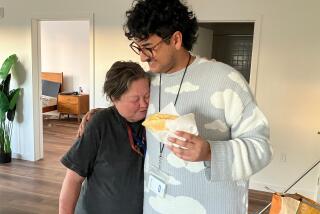Former Owner of Quarter Horses Operates Bed and Breakfast
- Share via
Ginger Hyland went from being a pampered princess to champion quarter-horse breeder and trainer, but now is running a bed and breakfast in a restored Victorian-style farmhouse in the tiny community of Lake Hughes.
She misses her horses, but she loves living in the past.
Hyland was born in 1947 into a family of privilege, and grew up in a mansion in Holmby Hills. Her late father was L. A. (Buzz) Hyland, credited with discovering radar, a distinction that caught entrepreneur Howard Hughes’ eye.
Hughes hired Buzz Hyland after he served in the Navy and brought him to California to run the Hughes aircraft empire. Hyland was president and then chairman of the board from 1954 until his retirement in 1983.
Ginger Hyland attended posh Westlake School where she was two years behind Candice Bergen. But a life-changing experience occurred in December, 1959, when the Hylands took a drive out to the wilderness of what was then the even tinier community of Lake Hughes.
“My parents wanted a little weekend getaway where we could have horses and some beautiful scenery,” she says.
The Hylands drove to the northern end of Los Angeles County to look at a ranch for sale, but ended up at another property.
“A little girl was selling apples by the roadside so we stopped to buy some and chat with her and her father,” Hyland recalls.
“Her father told us about another property we might want to look at since it was on the way to the one we’d originally set out to see. We drove to the White Oaks Ranch where my parents took one look and bought it on the spot.”
The family has owned the White Oaks Ranch ever since, moving into it full time after Buzz Hyland’s retirement. Her mother still lives there. After Ginger Hyland attended Cal Poly Pomona and the University of Lexington she also came back.
“I was taking the pre-veterinarian course but didn’t stay because that wasn’t what I wanted,” she said. “What I wanted was to breed and raise quarter horses.”
In recent years, Hyland was forced to sell her own horses for financial reasons, but still trains other people’s horses.
She also has a new passion to help keep her occupied, one that was sitting next door to her for years.
The Victorian next to the Hyland ranch was built in 1892 by members of the Manzana Colony.
“The colony was a group of Midwest farmers who had come out in the later part of the 1800s and grew fruit trees, mostly apples, apricots and plums,” Hyland says. “But a drought forced them to sell the property, which was then bought by three brothers from Yugoslavia who stayed until the last brother died in 1977.”
Hyland bought the house in 1979 when it was in bad shape. “Everything needed doing,” Hyland says.
She brought to the restoration some of the same enthusiasm she poured into breeding champions.
“I worked with Linda Allen from . . . Tennessee, who is a master at antiquing and restoring antique things,” she says.
Because of the local interest shown in the house, Hyland now allows visitors to tour the property.
For those who would like a longer stay, there is a new bed and breakfast in back.
“The front porch of the Victorian looks out on the lawn and the gazebo, where we hold weddings. In back there is a stream, meadow, duck pond and the National Forest,” she says.
Hyland, who never married, says she loves taking people through the Victorian and has received many letters from people saying how much they enjoyed the experience.
She says she enjoys sharing her beautiful new architectural baby with the public.
“I invite people to come out and spend a day 100 years ago,” she says.
Alcoholism for the Elderly Can Be Life-Threatening
What’s the harm in grandpa taking a few sips too many?
What if grandmother is nipping in the sherry and it’s starting to nip back?
Well, haven’t old folks earned the right to overdo it?
Where’s the harm, after all?
According to Al Jeffries, executive director of the National Council on Alcoholism and Drug Dependence, headquartered in Van Nuys, the harm can be life-threatening.
“We’re not talking about people who are going to jeopardize their marriages or jobs or go out and kill someone driving,” Jeffries says. The problem is that these people may be killing themselves by putting their already frail bodies at risk of injury and malnutrition.
Jeffries, head of the San Fernando Valley and Santa Clarita Valley area council offices, says many elderly people who slip over the edge from social drinking to alcoholism do so because of loneliness, isolation and fear of illness and death.
“Once drinking increases, so does the chance of dangerous falls and loss of appetite,” says Jeffries. “Alcohol also blocks the body’s ability to absorb nutrients that the frail older body desperately needs.”
He adds that many elderly are in denial. “They don’t want to hear what we have to say.”
But that doesn’t stop Jeffries and his staff from trying to help older people protect themselves from the problems that accompany alcoholism. And they keep trying to develop new ways to reach this group.
In the Santa Clarita office, C. W. Frost is part of an intervention team that gently confronts elderly alcoholics upon request from family or friends.
Both Frost and Jeffries say the elderly will continue to be a target population for their ongoing efforts, but that reaching them is the hardest part.
Lancaster Man Helps Others Only Because It Feels Good
Charlie Towner was born with cerebral palsy in Lancaster 50 years ago. He struggled through school, then held a number of low-paying jobs. His last job lasted only one day after he fell off a construction-site elevator, injuring his shoulder.
“The lift was one of those open things they use to take workers up and down. Another man on the lift jumped off and Charlie fell off,” his mother, Theresa Towner, says.
She adds that being on disability hasn’t slowed him down any more than his disease has. “He’s got a good attitude and he enjoys life,” she says.
He is also one of the most active members of the Lancaster community. “No matter what’s going on, Charlie is there to help,” Connie Wilson, of the Chamber of Commerce, says.
Towner helps get trees for needy families at Christmas. He lines up tractors to pull floats for the annual Lancaster parade. He helps local service groups, like the Elks, with their charities.
Charlie knows everyone in town, and knows how to get things done, Wilson says.
In 1990, the chamber honored him at a dinner with its Unsung Hero of the Year Award. Since then, he’s stepped up his efforts to be a positive force in the Lancaster community.
Asked why he does all the community service work, he says, “It makes me feel good.”
Overheard:
“I love eating here. It’s so reassuring. It makes me feel as if the ‘80s might come back after all. Don’t you agree?”
Woman at the Bistro Garden in Studio City to her luncheon companion.






